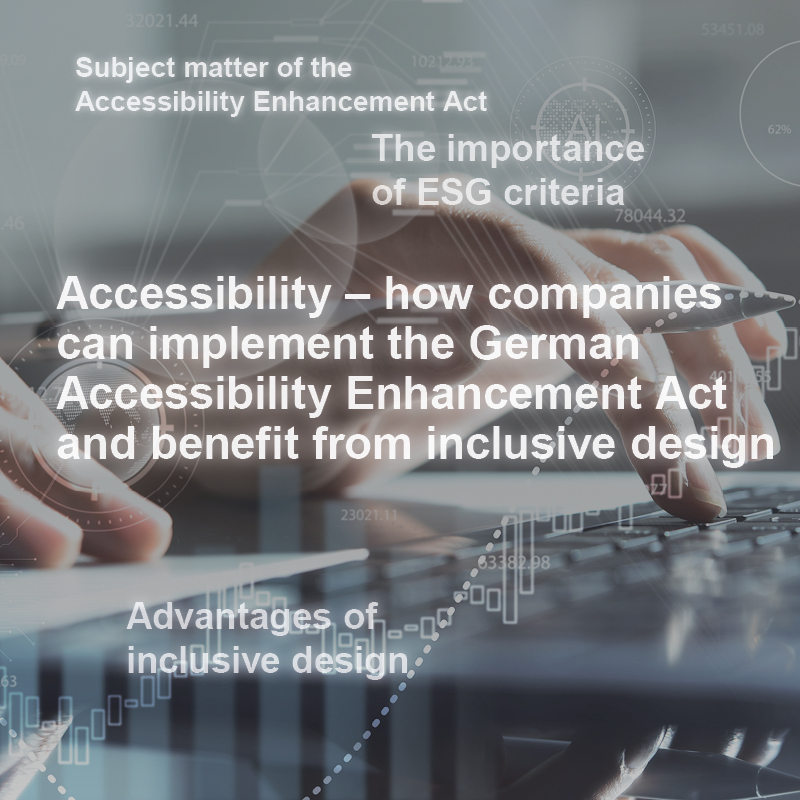01.03.2024
Accessibility – how companies can implement the German Accessibility Enhancement Act and benefit from inclusive design

In a constantly evolving business world, sustainability and social responsibility are no longer just buzzwords, but decisive factors for a company’s success. Environmental sustainability, social commitment and accessibility are the new key components to forming and cultivating long-term customer and business partner relationships. In addition to acting in an environmentally conscious manner, companies today must also ensure barrier-free access to their products and services.
Accessibility is becoming increasingly important in the context of ESG (environmental, social and governance). Companies that pay attention to ESG issues tend to make their products and services accessible and to better integrate people with disabilities. An accessible design can also make economic sense, as it enables access to a larger market and ultimately leads to higher sales.
The German Accessibility Enhancement Act (BFSG), which was promulgated in July 2021, is an important milestone in this context. It requires companies to make their products and services accessible to everyone. But how can companies ensure that they fulfil the requirements of the Act? What role do ESG criteria play in this? And how can companies benefit from inclusive design? In this article, we show how companies can successfully implement the Accessibility Enhancement Act and benefit from inclusive design and a modern ESG strategy.
With the Accessibility Enhancement Act, the Federal Republic of Germany is implementing Directive (EU) 2019/882 of the European Parliament and of the Council on the accessibility requirements for products and services. The purpose of the Act is to ensure equal and non-discriminatory participation in society for people with disabilities, as well as taking account of the harmonisation of the internal market. By implementing uniform EU requirements, the Accessibility Enhancement Act is also intended to help small and medium-sized enterprises make full use of the opportunities offered by the European Single Market.
Computers, e-books and tablets for consumers and websites and telecommunications services are just some of the products and services that will fall within the scope of the Accessibility Enhancement Act if placed on the market after 28 June 2025. In addition, the Act will also affect the entire e-commerce sector, as services provided via the internet with a view to concluding a consumer contract will be covered as “e-commerce services”.
According to Section 3 (1) of the Accessibility Enhancement Act, products and services are considered to be barrier-free if they can be found, accessed and used by people with disabilities in the usual manner, without particular difficulty and generally without the need for help from others. The specific accessibility requirements for products and services are determined by the German Accessibility Enhancement Act Ordinance (BFSGV), which was promulgated in June 2022.
The Accessibility Enhancement Act and the Accessibility Enhancement Act Ordinance impose various obligations on economic operators. In addition to the obligations that must be fulfilled before the products are placed on the market, manufacturers, importers and service providers are also required to perform special labelling and information obligations under the Accessibility Enhancement Act. The Accessibility Enhancement Act Ordinance defines a number of specific requirements that must be fulfilled by certain products and services. In order to meet the requirements of the Accessibility Enhancement Act, an accessible design should be included in the planning process from the outset, as subsequent redesign can be very costly for companies.
ESG criteria play an important role in accessibility, as companies are obliged to act in a sustainable and responsible manner in their area of responsibility. This goes beyond a purely ecological perspective and also takes social and governance-related aspects into account. The Accessibility Enhancement Act requires companies to make their products and services accessible to everyone. In order to fulfil the ESG criteria, companies must ensure that they design their products and services in accordance with national and international law. This is the only way to ensure that they comply with the applicable accessibility provisions. Compliance with these rules is very important, as non-compliance could result in legal consequences, such as fines, liability and loss of reputation. Companies should therefore take care to fulfil the requirements of the Accessibility Enhancement Act and other ESG criteria with a view to creating a sustainable, responsible and barrier-free future.
One thing should be kept in mind in this context, namely that the effort can be worthwhile. Companies that design accessible products and services, thus meeting the requirements of the Accessibility Enhancement Act, can benefit from this: accessible design can lead to an increase in market shares, consumers – including those without disabilities – appreciate an inclusive business model, and accessible design also regularly increases the general usability of products and services. Consequently, implementing the Accessibility Enhancement Act can promote a company’s image as socially responsible and inclusive. Furthermore, companies that provide accessible products and services have a competitive advantage over their competitors, as they offer a more varied range of products and services. This can help achieve and maintain an even stronger position in the relevant market.
There are many possible ways to integrate an accessible design into business practice. Providers should ensure, for example, that their website or app is accessible and usable at all times. Furthermore, documents should also be provided in a language which can be easily understood.
Companies should not wait to deal with the Accessibility Enhancement Act, as product development can be a lengthy process and compliance with accessibility requirements is already necessary today, including in e-commerce. In this context, it should be noted that the Accessibility Enhancement Act grants consumers the right to make an application to the competent market surveillance authorities if they believe that a product or service violates the law. The authorities can then initiate the appropriate measures, which can range from a simple request to take immediate remedial action to measures prohibiting the provision of the product or service concerned and may even include severe fines and criminal penalties.
Economic operators would be well advised to seek expert legal advice in order to correctly implement the requirements of the Accessibility Enhancement Act. This is the only way to ensure that non-compliant products and services are no longer placed on the market in future.

Dr Christoph von Burgsdorff, LL.M. (Essex)
Partner
Hamburg
christoph.von.burgsdorff@luther-lawfirm.com
+49 40 18067 12179

Luisa Kramer
Associate
Hamburg
luisa.kramer@luther-lawfirm.com
+49 40 18067 18792